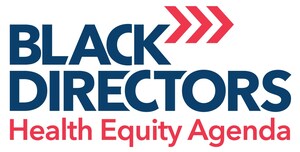CHICAGO, May 9, 2023 /PRNewswire/ -- A new publication from the Black Directors Health Equity Agenda (BDHEA) and Deloitte, sponsored by the Commonwealth Fund, offers guidance to board directors interested in mitigating health care's contributions to emissions-driven climate change and climate-driven health disparities.
"Accelerating Health Equity & Business Resilience Through Decarbonization," available to the public, was developed in response to the health sector's material role in the climate crisis. U.S. health care organizations produce 8.5% of U.S. greenhouse gas emissions. These emissions in turn accelerate asthma, allergies, respiratory diseases and heat-related deaths among Black Americans.
Decarbonization as a Boardroom Priority
Reducing an organization's carbon footprint can mitigate the worst impacts of climate change while driving business value. The guide uses real-world examples to illustrate how organizations can adopt a decarbonization plan to realize reputational, financial, operational and supply chain benefits.
"Health care board directors lead the organizations we serve to fulfill their mission to promote health and well-being," said BDHEA Founding Member and Board Member Joe Wilkins. "Reducing health care's emissions footprint is essential to protect our patients and communities against the negative health impacts of our changing climate."
The action guide educates board directors on the relationship between climate impacts and health equity. The physical environment, including climate, is one of the key drivers of health that contribute to health outcomes. For example:
- Extreme heat: Communities of color and historically redlined communities are often more vulnerable to extreme heat due to factors such as limited tree canopy.
- Wildfires: Black and Hispanic/Latino individuals, particularly children, suffer disproportionately from respiratory conditions such as asthma that are made worse by wildfires.
- Severe weather: Communities of color are more likely to experience displacement during and after hurricanes, which are linked to long-term mental health issues such as post-traumatic stress disorder.
"The impacts of climate change on human health are very real and happening now," said Deloitte Consulting LLP Managing Director and physician leader Dr. Elizabeth Baca. "We have a responsibility to transform the way we do care–reducing redundancies, supporting prevention and forecasting climate-related health impacts–to limit the worst effects of climate change and in turn advance health equity."
A Climate Action Framework for Health Equity
The decarbonization action guide outlines key competencies required for board directors to lead on decarbonization:
- Strategic Integration: Embed climate considerations into strategic planning in a way that informs decision-making processes and incentivizes enterprise transformation.
- Materiality: Assess the short and long-term materiality of climate-related risks and opportunities for the organization on a regular basis.
- Talent and Incentives: Ensure that the selection, evaluation and compensation of the CEO and executive leadership is aligned to decarbonization goals.
- Structure and Governance: Determine the most effective way to integrate climate considerations into board structure, committees and processes.
- Reporting and Disclosure: Ensure that material climate-related risks, opportunities and strategic decisions are consistently and transparently disclosed to all stakeholders.
- Collaboration: Maintain regular exchanges and dialogues with peers, investors, suppliers and other stakeholders to encourage the sharing of methodologies and collective action.
"The Commonwealth Fund is dedicated to creating an equitable, high quality health care system and mitigating the health care industry's contribution to climate change is an important part of that vision," said Commonwealth Fund Vice President Lovisa Gustafsson. "We hope that health care leaders will join us in forging a more equitable and resilient health system."
Download "Accelerating Health Equity & Business Resilience Through Decarbonization" at bdhea.org/offerings. To learn more about BDHEA membership, visit member.bdhea.org. The action guide builds on the recent BDHEA-Deloitte environmental, social and governance publication "Health Equity's Essential Role in ESG Conversations," offering a framework for board directors to influence the ESG strategies of the organizations they serve.
About BDHEA
The Black Directors Health Equity Agenda (BDHEA) is made up of board directors and senior leaders who are working to eradicate the health disparities and inequities that threaten the individual and collective prosperity of Black families. As change agents, its members across the health ecosystem foster and facilitate board education for up-and-coming leaders, encourage revised business models, spur innovative thinking and action and support policy reforms that advance health equity for Black Americans that will ultimately ensure equal and fair healthcare for all. Learn more at bdhea.org.
About Deloitte
Please see www.deloitte.com/us/about for a detailed description of our legal structure.
About The Commonwealth Fund
The mission of the Commonwealth Fund is to promote a high-performing, equitable health care system that achieves better access, improved quality, and greater efficiency, particularly for society's most vulnerable, including people of color, people with low income, and those who are uninsured. The Fund carries out this mandate by supporting independent research on health care issues and making grants to improve health care practice and policy.
CONTACT:
Kimberly Palacios
Purpose Brand
773-853-4794
[email protected]
SOURCE Black Directors Health Equity Agenda

WANT YOUR COMPANY'S NEWS FEATURED ON PRNEWSWIRE.COM?
Newsrooms &
Influencers
Digital Media
Outlets
Journalists
Opted In






Share this article